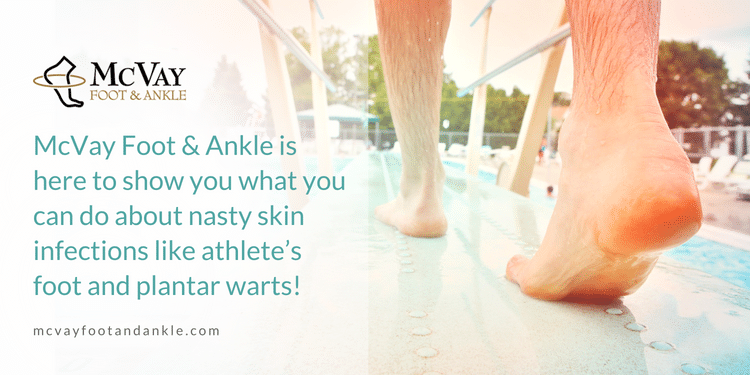Pick Up Something Nasty at the Pool? Here’s What to Do for Skin Infections
On some of the hotter days when you didn’t choose to hide beneath an air conditioner (we don’t blame you), you might have hit the area pools instead. Or maybe you still crushed your routines at the gym each week no matter the temperature outside. Your determination is admirable!
Whether around public pools or locker rooms, though, there’s always some risk of picking up a skin infection on your feet. If you have been so unfortunate this summer, you’ll probably want to know some more about what you’re facing. And if you haven’t picked up something awful, you will want to know how you can keep from doing so!
Let’s take a look at a couple of the most common types of skin infections to creep up on feet.
Athlete’s Foot
What causes it? Athlete’s foot is caused by a certain breed of fungus. The same type of fungus can also be responsible for ringworm, jock itch, and fungal toenails.
What does it look like? The way athlete’s foot presents itself can vary, but a red, scaly rash is typically a common sign of the condition. The rash often begins between the toes and can become very itchy, usually right after you go barefoot. This itching can be accompanied by stinging and burning.
A “moccasin” type of athlete’s foot shows itself more as scaling and dryness that creeps along the bottom and sides of the foot. And in other cases, blisters or sores may also appear.
How contagious is it? Pretty contagious. It can be picked up from human-to-human contact, and touching surfaces such as floors, towels, and shoes that may be harboring it.
It is also relatively easy to spread a case of athlete’s foot around your own body by touching and picking at the condition with your hands. If you have athlete’s foot, wash your hands constantly and avoid contact with the area as much as possible!
How do I treat it? Most cases of athlete’s foot can be treated at home with an over-the-counter anti-fungal medication. If you don’t see any improvement, however, or the case is particularly severe, a prescription-strength treatment may be needed instead.
Plantar Warts
What causes it? Plantar warts are caused by a virus—namely a particular form of HPV. The virus makes its way in through very small cuts, splits, or other points of weakness in the bottom of the feet.
What does it look like? Warts tend to take the form of small, rough patches along the bottom of the foot. They are most commonly around the base of the toes, forefoot, or heel.
The warts may be spread apart, or clustered together into a “patch” of sorts. Hard, thick calluses also tend to form over the infected areas.
You might see small, dark dots in the warts. Some call these “seeds,” but they are not. They’re tiny blood vessels that have been disrupted by the arrival of the warts and have clotted. Don’t try to pick these dots out!
Pain is not always a symptom of plantar warts, but they can grow in places where they become tender to walk upon.
How contagious is it? While not as easily spread as athlete’s foot, plantar warts can still be contagious. It does not tend to be spread from person to person, but you can still be exposed to it by making contact with places that may be harboring the virus.
How do I treat it? The good news is that plantar warts are relatively harmless and will ultimately go away on their own.
The bad news is that, without treatment, the warts don’t tend to go away for a very long time. There are cases that last up to a couple years!
There are home remedies and myths for treating warts, but the vast majority of them won’t do a thing. They won’t hurt to try unless it involves actually cutting into or otherwise damaging your skin. Don’t do that.
If you want to get rid of your warts in ways you know will be effective, come see us. We can help you determine your best course of action.
How to Prevent Infections
Both athlete’s foot fungus and plantar warts virus love places that are warm and damp. This makes public pools and locker rooms suitable breeding grounds.
But an ounce of prevention is worth a pound of anti-fungal ointment. Thankfully, there are some easy steps you can take to help limit your contact with places these contagions tend to reside.
- Wear Shower Shoes – The less exposure your feet have to potentially contaminated surfaces, the better. Sandals can also work, but they don’t protect the whole foot. They also tend to slip off.
- Dry Your Feet Well – Once you’ve cleaned up, make sure to dry your feet completely before shoving them in your shoes. If you think locker rooms can be warm, damp incubators, think how the insides of your shoes could be!
- Keep Your Shoes Ventilated and Dry – While speaking of shoes, opt for a pair that “breathe” and avoid those made of vinyl or rubber. Those tend to encourage generation of retention of sweat, which organisms love to thrive on. If your feet sweat a lot, consider bringing a second pair of socks with you to change into halfway through the day.
- Don’t Share Gear or Equipment. Not shoes. Not socks. Not towels. Not ever.
Despite your best efforts, sometimes insidious fungal or viral infections still find their way onto your feet. If they do, and a home treatment isn’t fixing things, do not hesitate to reach out to us!
Call our Colorado Springs office at (719) 266-5000 or fill out our online contact form. We will be happy to schedule an appointment to help with any foot or ankle concerns you might have.
© McVay Foot & Ankle. All Rights Reserved
Web Design by CP Solutions
Marketed by VMD Services
Privacy Policy | Terms & Conditions

